Jack Edwards of Piston: Living Proof That Rock ‘n’ Roll (AND Guitar Dreams) Can Indeed Come True.
The perfect rock ‘n’ roll fantasy movie script would read something like this:
In 2006, a cool British mom who has raised her and her husband’s 11-year-old son on classic rock, takes her son to his first concert to see The Cult. The boy is completely blown away by lead guitarist Billy Duffy and is mesmerized by the big white guitar Duffy is pounding on. After the show, the boy even gets two of Duffy’s guitar picks as souvenirs. Right then and there, the boy decides to become a professional musician. He also pledges to one day own a big white guitar like the one Billy Duffy played onstage.
Fast forward to 2020, and the boy is now a 25-year-old man, is a talented lead guitarist for an up-and-coming UK rock band, plays a Gretsch Billy Duffy Signature White Falcon guitar, and, within the past year, has become a Gretsch Guitars endorsed artist, met his guitar hero Billy Duffy, was featured alongside Duffy in a Total Guitar magazine article as well as a video, and was asked by Duffy if he and his band could open for The Cult for some of their UK tour dates.
But this isn’t a rock ‘n’ roll fantasy or a movie script. All of this actually happened to Jack Edwards.
It really did!
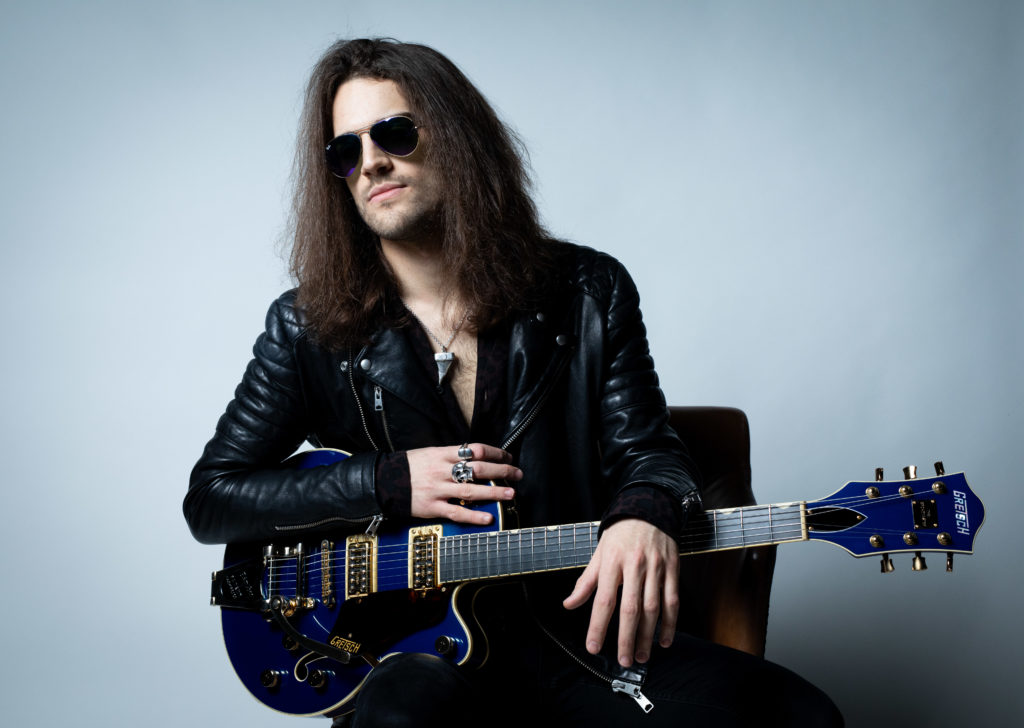
Jack Edwards / Backroom Studios / Shot by Rob Blackham / www.blackhamimages.com
Born and raised in Staffordshire, England (also the birthplace of Glenn Hughes of Deep Purple fame), Edwards grew up in a home with a classic rock soundtrack playing in the background. “I had a great childhood. My parents aren’t musically inclined or play any instruments, but I’ve always been brought up around good rock music; I’ve never known any different,” shares Edwards. “I remember my dad being out in the garage working on his Harley-Davidson and hearing Guns N’ Roses, The Cult, The Doors, Black Sabbath, Alice Cooper, Poison, Bon Jovi, and all these classic rock bands, and I would hear that and think it was really cool. It’s definitely influenced the way that I play.”
Shortly after seeing The Cult, Edwards took the first step in fulfilling his dream and got his first guitar. Mostly self-taught through DVDs (Edwards confesses that the Learn To Play Joe Satriani DVD was the most difficult), Edwards played in bands in school and performed at countless open mic nights before getting his first break. “I got the rock ‘n’ roll experience when I was young-young, like 16 or 17, when I was in a Guns N’ Roses tribute band and did a lot of touring. And that really did help. I don’t really get nervous playing in front of big crowds because we were playing in front of huge crowds.”
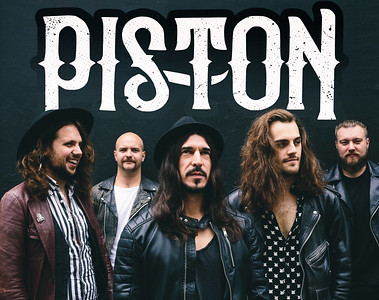
The five members of Piston. L to R: Brad Newlands, Stuart Egan, Rob Angelico, Jack Edwards, Luke Allatt. Photo by Rob Blackham.
Edwards founded Piston, a no-frills, high-energy UK rock ‘n’ roll band in 2012. With Rob Angelico on gritty, soulful lead vocals, Brad Newlands on drums, Stuart Egan on bass, and Luke Allatt also on guitar, Piston has been making lots of noise, touring heavily, building a loyal fan base, and is recognized as one of the UK’s most promising up-and-coming hard rock bands.
They also released a killer debut album.
Piston’s highly anticipated self-titled debut album, released on Friday the 13th in 2019, received rave reviews from a slew of magazines including Planet Rock (4 stars), Classic Rock (7 stars), Powerplay (9/10), HRH, Fireworks, Black Velvet, as well as over 100 music websites. Their sound and attitude, a modern-day homage to rebellious 70s and 80s hard rock, has been compared to AC/DC, Lynyrd Skynyrd, the Black Crowes, The Cult, Foo Fighters, Led Zeppelin, Airbourne, and other groundbreaking classic rock bands.
2019 was a very, very busy year for Piston. In addition to recording their debut album, they also had co-headline tours with Collateral and the Planet Rock Roadstars, played UK shows with Phil Campbell & The Bastard Sons, and toured as special guests of Glenn Hughes on his “Performs Classic Deep Purple Live” tour.
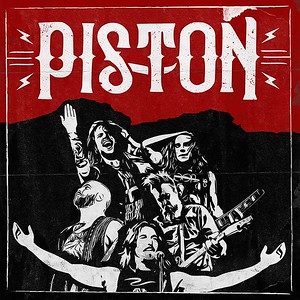
Cover art for Piston’s self-titled 2019 debut album.
But without a doubt, a touring highlight (for both Edwards and Piston) came in October when Piston opened as special guests on The Cult’s Sonic Temple 30th Anniversary UK Tour. Edwards’ rock ‘n’ roll and White Falcon fantasy had come full circle. He’d be sharing the same stage as his hero, Billy Duffy, and his all-time favorite band. Pretty heady stuff.
Edwards is also being recognized for his vast guitar talent. In 2019, Total Guitar Magazine featured him as one of their “Ones To Watch” and published a 6-page feature with him and Billy Duffy and their White Falcons. To top off the year, Edwards and fellow bandmate Luke Allatt being ranked #3 in MusicRadars “10 best new guitarists in the world right now.”
2020’s schedule and pace has been a different story for Edwards and Piston, however, due to Covid-19. “Last year was so full-on. A lot of shows, lots of touring, and long, long hours,” shares Edwards. “So, for me personally, it’s been good to have a break and get my head back to some common normality and get focused again.”
Edwards has stayed busy through the lockdown by practicing, writing new music and song ideas for Piston’s second album, staying in touch with his bandmates, and teaching guitar (he currently has 40 online students). That’s in addition to the many hats he wears within Piston, such as managing, handling the bookings, and being responsible for the band’s content and social media presence.
We caught up with Edwards over in Staffordshire, England via Skype to talk about his Hollywood story, shredding tips, what’s next for Piston, and, of course, Gretsch guitars.
Since the lockdown, have you had the opportunity to learn any new skills or take up any hobbies?
Yes, but nothing musical. I’ve learned how to cook, now. Being on the road, I guess you just rely on service stations and eat terrible food, so I’ve learned to cook, which is another string to my bow. I can make a mean paella or chimichurri skirt steak.
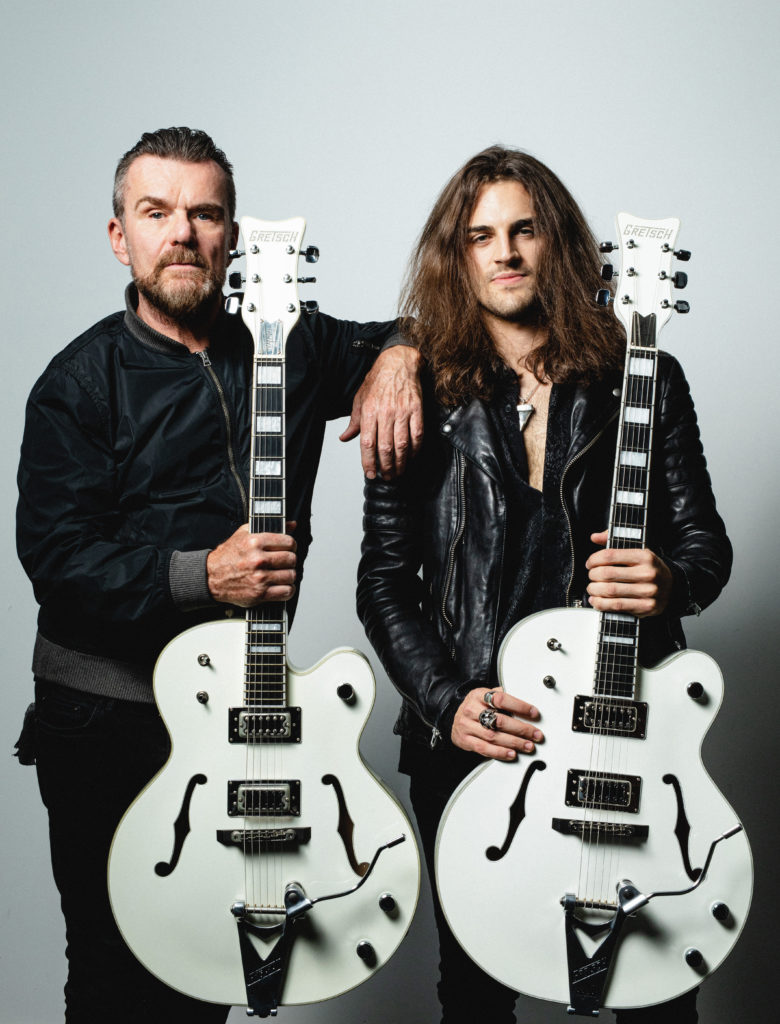
Edwards with his guitar hero, Billy Duffy of The Cult. Photo by Rob Blackham.
Your Billy Duffy “Circle of Life” story is unbelievable. What’s it like having your guitar hero as a personal friend?
Yeah, it’s a bit crazy and a bit weird. Billy is a friend of mine now and we talk quite a lot. On one hand, he’s just normal and we chat like normal people, but on the other hand, I’ll never forget that he’s the reason I got into playing and he knows that. I think we resonated because the exact same thing happened to him when he was 16 and met Johnny Thunders, so Billy and I had very similar stories that we bonded over.
I read that you used DVDs to learn how to play like Billy and your other favorite bands.
When I first started playing, I had a couple of formal lessons, but the guitar teacher was teaching me things I didn’t want to know. Looking back, he was doing a good job, his intentions were good, I just wanted to learn to play my favorite bands. I learned on my own mainly by DVDs. I’d learn how to play five songs from Guns N’ Roses, then I’d put another one in on how to play like Joe Satriani, which was the hardest one to learn at that point, but I really got my chops up. So, I went through all these players because I enjoyed it, but it was flat-out wrong because the DVDs just taught you how to play songs, it didn’t teach any theory or what was behind it, so I ended up getting formal lessons to fill in the gaps of what I didn’t know. But I’m mainly self-taught.
Did those DVDs build the foundation for you playing in a band like Piston?
When I was younger, I learned all the technical stuff and learned to play like Satriani and really worked on that technique, but it doesn’t come out in my playing in my band. I can do it, but to me, I’d rather play one note and connect to my audience than play 300 notes and have it go over their heads. I mean, when I was younger, I would try to play a million notes and I thought it would impress people. But if you play one note, it impresses people a lot more if you play it and make it sound really, really good.
You toured a lot as a teenager. How did that experience prepare you for touring today?
I was in a Guns N’ Roses tribute band when I was 16 and did a lot of touring in front of big crowds. So, by the time I joined Piston, all of my bad gigs were done, they were behind me. I knew what to do and knew how to handle situations, so I had the experience and walking onstage to 3,000 people didn’t make me nervous at all. What does make me nervous, makes me anxious, is making sure all the gear works, that the guitar rigs won’t go down, all the things you can’t predict. In terms of playing, I’ve always been confident in my playing, I’ve always been well prepared. If I break a string, I’ll just play on the next string, you know?
Your tone really cuts through in Piston. What’s your secret?
In the band, the Gretsch really helps, that’s the biggest part, just the guitar itself. And it’s a completely stock Billy Duffy, it hasn’t been modified. Before I had my White Falcon, I could never get a guitar that would cut through the mix. Especially in my band because it’s loud and we have another guitar player (Luke Allatt) and he has great tone. Now people can actually hear me, and sonically it really fits in, you can hear both guitars really clear. That’s the first time I ever had that.
Do you use many effects in your rig?
Not really, I keep it simple. I had my first gig earlier this year with a Tourbox, so that’s my new sort of gadget. I do use the Falcon with a really gnarly fuzz pedal made by Voodoo Labs. That’s really cool. So, it’s just those two through a loud cranked amp and I’m ready to go. I’ve only got to do one gig with the Tourbox. I’m eagerly awaiting to see what more I can do with it, but it’s really cool to use a Tourbox with a Falcon. I think that’s a first.
What’s it like sharing the stage and studio with Luke Allatt, a fine guitarist as well?
Luke’s a fantastic rhythm player. He’s the best, most aggressive rhythm player I’ve ever come across because he comes from a modern-metal background. So, in the rock world, he’s so solid and everything is downpicked, and he just crafts a really nice foundation for me and I can sit on the top of that. We don’t get in each other’s way at all because he’ll be downpicking everything and really involved, and I can be sitting on top with alternative picking.
You and Luke complement each other so well. How do you make it work?
I think the main thing is just not having an ego. We really don’t get in each other’s way. If Luke wants to take a solo, I’m absolutely cool with that and if I want to take a solo, he’s fine with that. If anything, I encourage Luke to play more solos, he’s really good. I like sitting back, sometimes, sitting by the drummer and playing rhythm. I really enjoy playing rhythm.
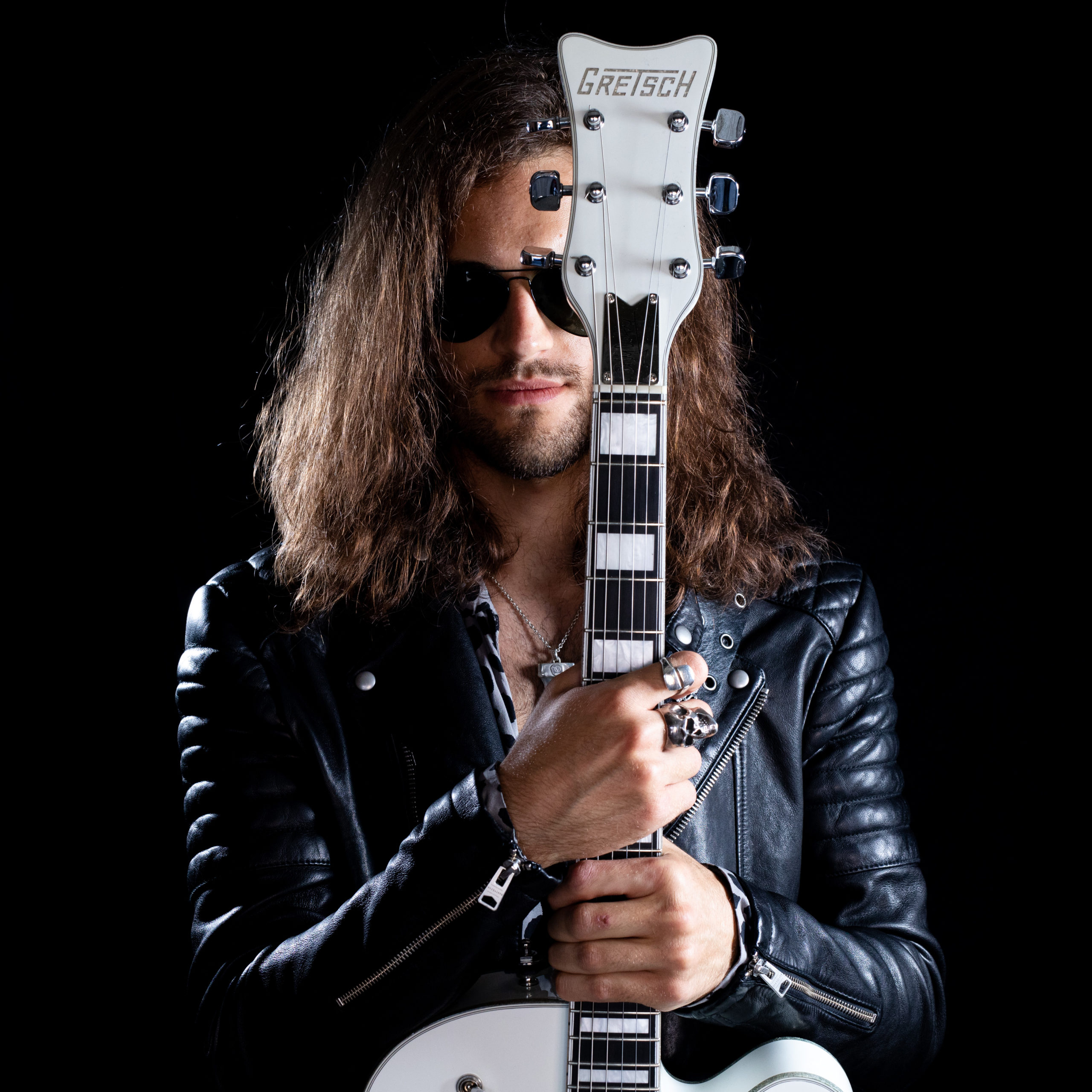
Photo by Rob Blackham.
What is the Jack Edwards approach to soloing?
Over the years, my solos have become less technical and more about creating a part for a song. I’m not really a fan of guitar solos that are just there to show off the guitar player, I mean, that doesn’t really bring any excitement to me or as a listener. There are a couple of songs with a bit of shredding, but that’s because the song calls for it. I think overplaying is the worst thing anybody can do.
How would you describe the song writing process for Piston?
A little unconventional. There are four band members that live around where I live: the drummer, bass player, and both guitarists. So, we write the music and record it on a phone or computer and send it to our singer (Rob Angelico) who lives about three hours south in London. In England, that’s a long drive, it’s probably a short drive in America. Rob records his vocals and about once a month we’ll all get together and flesh out these ideas, extend parts, change parts. It’s unconventional, but it’s always worked for us. That’s how we write our songs.
What kind of goals has the band set for the rest of 2020 and 2021?
For us, it’s about just connecting more with people, with our audience. We want to look out for the people that support our band as much as we can. That is our main goal. Just getting even more engaged with our audience. And if you’re engaged with your audience, then your followers will go up and your sales will go up. So, that’s going to be our main goal for the next 12-to-18 months. We’ve also been writing a bunch of new music and song ideas which are ready to be fleshed out once we can get into the rehearsal rooms. We’d like to finish our second album and sell out five-or-six shows across England, Scotland, and Wales next year.
Have you and the band set any big goals for yourselves?
We all have, sort of, big goals. There are a lot of bands that I’d like to tour with and would like to support. When you set measurable goals and goals that you can see happening, I think it’s better for the soul, I think, because everybody wants to sell out Wembley Stadium, but it’s like a thousand steps before you get there.
Touring with a legendary band like The Cult had to feel surreal for you.
It was, and they were so nice to us. There’s five people in our band and everything is just done between us, there’s no huge crew or anything. My girlfriend sells our merch and we have a tour driver who also doubles as our guitar tech. It’s funny, when we turned up for our first show with The Cult, we were asked, “Who’s your Tour Manager?” and I said, “Well, our bass player.” We keep everything homegrown and in-house so to speak.
A lot of times you go to these shows and you’ll turn up and they’ll say, “Right, you can’t use that, you can’t use the lights, you can’t use this or anything, you’ve got the stage and that’s what you have.” But when we turned up for our first show, they said, “Right, you can use all the lights and have whatever you want.” Plus we had personal chefs. We’d never had that before. Now that was really cool.
What did you learn from being around Billy and Ian and the rest of the band?
I think the best thing I learned is not to have an ego. Just don’t think that you’re bigger than you are. Because Billy and Ian (Astbury) and the rest of the band were just such nice, down-to-earth people. Of course, they’re big players and a big band, but they were just nice people, really nice people. I didn’t know what to expect going into that tour, I mean, you hear horror stories about rock stars and “Oh no, what are we letting ourselves in for?” but they were amazing. Really, really nice. They had all the time in the world to speak to you. A lot of them would come into our dressing room and we’d chat with them, have a drink with them, and even the crew was incredible. Billy’s tech helped me out every night; anything I needed, he was there to help.
Did anything amusing or unusual happen to you during that Cult tour that you can share?
This is funny, actually, but during soundcheck at one of the gigs, Billy’s guitar tech asked me if I’d ever tried out Billy’s signature wah pedal. And just after he said that, my wah pedal broke. It literally stopped working. So, Billy’s tech came over to me and said there’s no better time than now to try it out and you can use it for the show. So, I’m onstage with my Billy Duffy White Falcon, using Billy Duffy’s signature wah pedal, and I look side stage and Billy’s watching me and I’m thinking, “Oh, he must think I’m so cheeky right now using his guitar and his wah pedal.”
What advice do you have for musicians, especially younger ones?
I think you’ve just got to stick at it, that’s the main thing. A lot of people in bands don’t start out as technically incredible players, you’ve got to put in the effort so that you all get good together. I don’t think a lot of people see that. If something’s not working, they’re very quick to kick a band member out or they’re quick to move on to a different project. I’m not like that, I’m very loyal in my surroundings and the people that I work with. Just stick at it. As long as everybody is getting along and are best friends and having a good time, you’ll get better and better and better.
In closing, how does it feel to be a Gretsch endorsed artist?
I’m so proud. I feel very, very lucky to be associated with the company. The Gretsch brand is incredible and what they stand for and how they’re so connected to their artists. It’s definitely a dream of mine that’s come true. I mean, just to own a White Falcon was a dream, and then to be welcomed into the artist family, it’s something I have to tell myself every day, “Wow, that’s just crazy.” It just excites me.
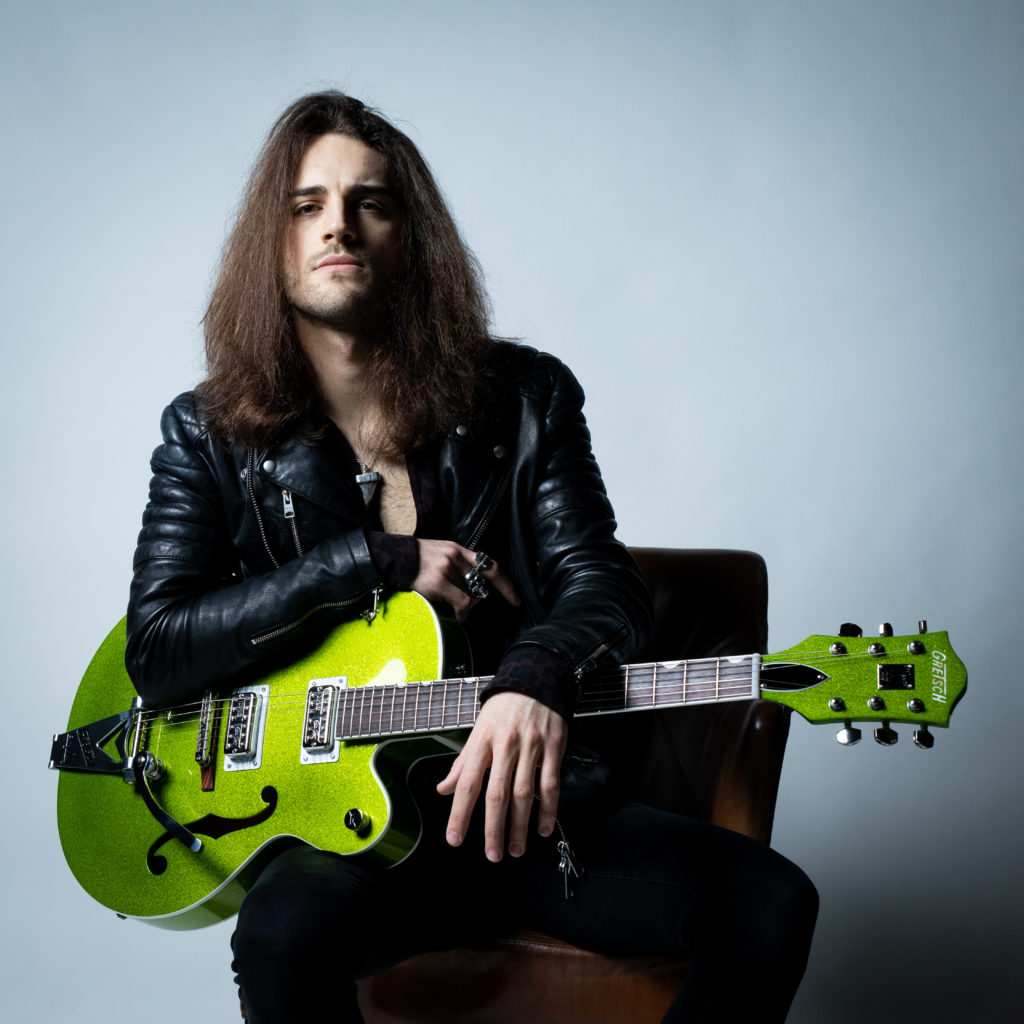
Photo by Rob Blackham.
Follow Jack on Twitter, Instagram, and Facebook. And be sure to visit Piston’s website and follow them on Facebook, Twitter, Instagram, and YouTube.
Enjoy these video selections:
The single, “One More Day,” has a Foo Fighters feel and a message about moving forward and trusting the natural progression of life.
Piston’s “Blow It Away” was described by metalplanetmusic.com as “Full of metal energy, chunky riffs and catchy rhythms, it is a great track to rock out to.” We agree.
Piston’s fun, festive cover version of Slade’s 1972 “Mama Weer All Crazee Now” featured cameos from Bad Touch, Collateral, Gorilla Riot, Sons of Liberty, New Saints, and Liberty Lies.
All photography by Rob Blackham, @BlackhamImages on socials.



 Previous
Previous